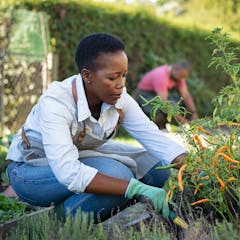
Articles on Bees
Displaying 1 - 20 of 246 articles

Urban bee hives in Canada face unique challenges and making our cities healthier for bees may just help them become better places for us all.

Transitions to diversified farming systems in Africa will require financial support. But barriers can be overcome.

A little corner of the garden set aside for wildlife can make a huge difference, if we all do it.

NoMowMay is a catchy concept, but it doesn’t provide the food that native North American pollinators need or lasting support for them.

This episode explores how colonial history has affected what we plant and who gets to garden. We also discuss practical gardening tips with an eye to Indigenous knowledge.

Wild bees face risks from domesticated bees, habitat loss, and climate change. Supporting bee diversity in Ontario is an important component of promoting a healthy environment.

99.96% of bee species do not die after stinging. So why does everyone think they do?

Many in the wider community still see sugar gums as risky trees that drop dangerous branches. But there is much to appreciate and admire about Eucalyptus cladocalyx.

Sometimes it seems the night is just buzzing with insects. But are there really more insects out at night? We analysed all the evidence on insect activity across the day–night cycle to find out.

Check that something is blooming every week, March through October, to help bees.

Many common insects seem to disappear during autumn and winter – but they are still around. Making your garden a good winter habitat can help these vital pollinators survive and thrive.

A queen’s main job in the hive is to lay eggs and pass genes on to offspring. But many bee species do just fine without queens or big colonies.

The nutritional needs of bees are complex and monoculture crops aren’t providing a diverse diet. Introducing more diverse wildflower meadows and green spaces could benefit wild pollinators.

Australia could still take action in the fight against Varroa that wasn’t possible elsewhere. But to do so, we need to fill urgent gaps in bee research.

By lifting their gaze to the treetops rather than poking around on the ground, researchers discovered eight new species of masked bees.

The native red admiral is less common than it used to be, but we can all help threatened bug species by ensuring they have the right habitats to thrive in.

Flowers tend to stand out against a natural background. A new study shows this contrast evolved in a key relationship with their most famous pollinators – bees.

Being susceptible to visual illusions is part and parcel of life not just for humans, but many other species – including bees.

Inert ingredients are added for purposes other than killing pests and are not required under federal law to be tested for safety or identified on pesticide labels.

Two EU-funded projects are looking at high-tech solutions that could transform honeybee colonies into bio-hybrid entities.
